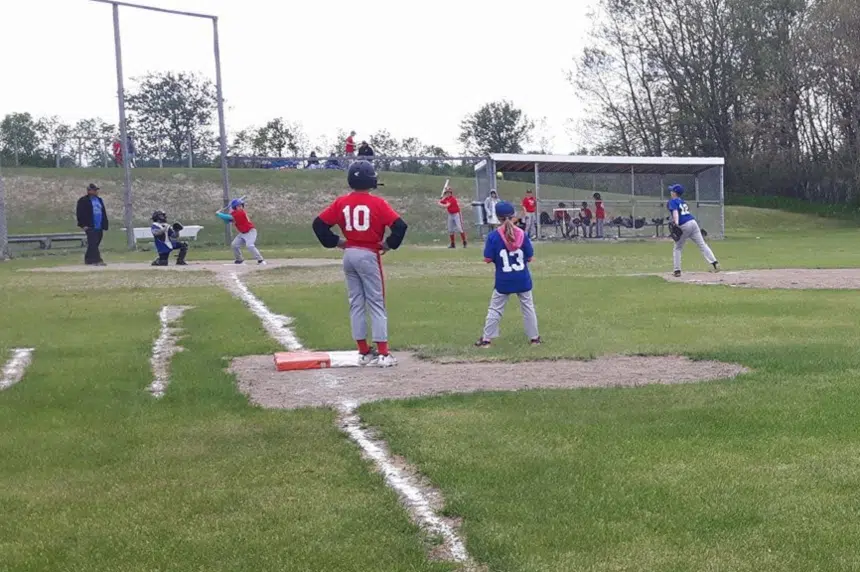The Saskatchewan government may have scored some points with a number of athletes Tuesday.
The provincial government announced public health measures that currently are in place for outdoor sports will be eased starting Sunday, when Step One of the Re-Opening Roadmap kicks in. Outdoor sports initially were to be included in Step Two of the plan.
The restrictions surrounding indoor sports are still part of Step Two, which is set to begin June 20.
Premier Scott Moe said during a media conference the government was able to pull outdoor sports forward to Step One because the risk of transmission of COVID-19 is lower outside — but mainly because vaccination levels are rising in the province.
The premier said the government’s goal is to remove public health measures as soon as possible, so moving outdoor sports up a step in the reopening plan was for him “a very, very significant step forward.”
“(Youths) haven’t had the opportunity — going into their second year now — to play competitive sports, whether it be softball, soccer, football (or) whatever that might be,” Moe said. “It’s among the highest priorities to reduce the impacts of this pandemic on our youth.
“By request of many, many people in conversations that I have had — as well as multiple public health officials have had — we felt it was safe to move with respect to this at this time of year.”
For parents like Krista Broda, it’s great news for her six- and eight-year-old sons who can take their baseball gloves out of storage.
“I’m really excited for it. Last year (leagues) proved they could do it safely and they made a lot of changes to (the sports) to make it safe for the kids and I think it’s a really, really great thing,” Broda said. “I think it will be a great thing for all of the kids to get some normalcy back.”
She said she’s noticed a change in her oldest son’s mood and motivation since sports have been reduced to just small practices.
“This will be a really big mood boost for him just to get out and socialize. He loves competition so that will be really good for him to get out and play against other teams,” Broda said.
Broda said the news makes her feel hopeful about things returning to normal.
“I think this is the start of something good,” she said. “I watched all the sports on the weekend and I’m just watching how it’s going in the U.S. It’s just something I’m hoping we can get back to soon with all the crowds and excitement in the U.S.”
Sports leagues across the province are very excited about the news.
“(Our members) have been waiting a long time for league play and game play to start and we couldn’t be happier,” said Guy Jacobson, executive director of Softball Saskatchewan.
He says the leagues are scrambling to set up schedules and some leagues may need more time than others to finalize league schedules.
Jacobson said while tournaments aren’t allowed yet — and with Canadian championships already cancelled — the hope is to hold provincials in August.
Regina Minor Football is also excited about the news, noting it allows Spring League teams to play games against each other.
The Spring League will also be the first time many high school players will hit the field in two seasons.
“I think it’s pretty important that they’ll get an opportunity to get some game film of themselves,” executive director Len Antonini said.
He said there are thoughts about creating an all-star team to play against a school in Saskatoon, if rules allow it.
Starting Sunday, those who play outdoor sports can do so under certain conditions. Those include:
- Participants can’t compete if they’re not feeling well;
- Leagues can begin play, but tournaments aren’t permitted. That’s to be revisited in Step Two;
- Interprovincial travel isn’t allowed. Teams competing in regional interprovincial leagues need to contact the Business Response Team prior to beginning play;
- Capacity has to follow the public health order for outdoor gatherings for each playing surface, with a maximum of 150 people. Common areas, such as those where there are multiple playing surfaces, must also follow the gathering limits set out in the public health order;
- Individual and protective equipment shouldn’t be shared. When equipment like bats or helmets are shared, cleaning and disinfecting is required between each use;
- Commonly touched equipment used for games (like footballs or baseballs) has to be routinely replaced or disinfected during practices or games;
- Coaches, officials, umpires, referees and players who are not on the field aren’t required to wear masks outdoors under the public health order;
- Participants can’t shake hands of offer high-fives;
- Spectators not from the same household should maintain two metres of physical distancing and should stay in designated areas. Masks aren’t required outdoors;
- Hand sanitizer approved by Health Canada or handwashing stations should be available for participants and spectators; and,
- Contact information of the coaches, officials and players should be recorded by the home team and kept to assist with contact tracing in case there’s a confirmed case of COVID-19.
Dr. Saqib Shahab, the province’s chief medical health officer, said the risk of transmission is higher during pre-game or post-game gatherings or when equipment is shared, so limiting those instances is vital for the plan to succeed.
“Actual transmission outdoors during play, the risk is much lower,” Shahab said. “But it’s one of those things: As our transmission rates come down at a community level and as our vaccination rates come up, certainly outdoor activities like sports becomes possible and encouraged.”
— With files from 980 CJME’s Britton Gray











